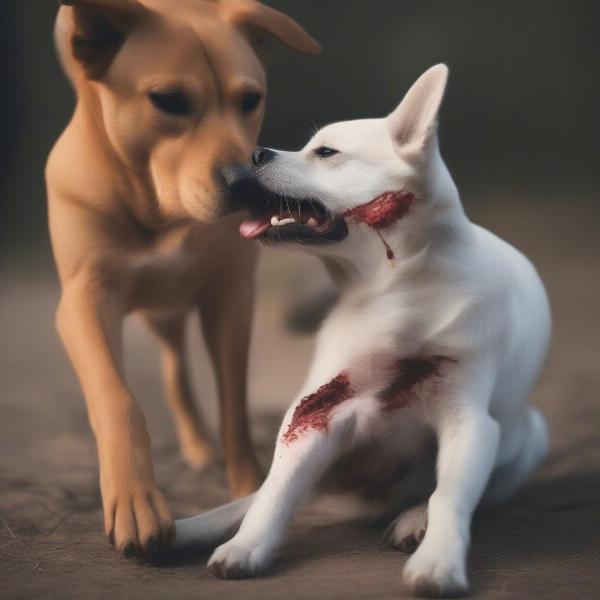Dogs lick for a variety of reasons, and while the act of a dog licking can sometimes seem random or even unpleasant, it’s often a form of communication. Understanding these reasons can help owners better interpret their dog’s behavior and strengthen their bond. While the specific phrase “dog lick tits” might suggest a particular, perhaps concerning behavior, it’s more likely that someone using this search term is curious about general canine licking behavior, potentially related to themselves or other people. This article will explore the various reasons why dogs lick, covering everything from affection and submission to anxiety and medical concerns.
Decoding the Lick: Why Do Dogs Lick?
Dogs, unlike humans, primarily experience the world through scent and touch. Licking is a crucial sensory tool for them, allowing them to gather information about their environment, other animals, and even themselves. It’s a complex behavior with a range of meanings, often depending on the context and the target of the lick. Let’s delve deeper into the most common reasons behind this canine behavior.
Affection and Bonding: A Lick of Love
One of the most common reasons dogs lick is to express affection. Just as humans show love through hugs and kisses, dogs use licking as a way to show they care. They might lick their owners’ faces, hands, or even feet, often accompanied by tail wags and happy whimpers. This behavior often stems from puppyhood, where mother dogs lick their pups to clean and comfort them. This association with comfort and care carries over into adulthood, making licking a natural expression of love and bonding.
Submission and Appeasement: A Sign of Respect
Licking can also be a sign of submission or appeasement. In a pack setting, a subordinate dog might lick a more dominant dog to show deference and avoid conflict. This behavior can also be observed towards humans, especially if the dog feels insecure or anxious. A submissive lick is usually quick and tentative, often directed at the face or hands.
Attention-Seeking: “Look at Me!”
Sometimes, a dog’s licking is simply a way to get attention. If they’re feeling ignored or bored, they might lick their owner, furniture, or even themselves to elicit a reaction. This type of licking is often persistent and accompanied by other attention-seeking behaviors, such as pawing or whining.
Exploration and Taste: A Sensory Experience
Dogs also lick to explore their surroundings and taste new things. Their sense of taste is less developed than ours, so licking allows them to gather more information about the objects and surfaces around them. This is why they might lick everything from the floor to the grass to your shoes.
 Dog licking a wound
Dog licking a wound
Anxiety and Stress: A Self-Soothing Mechanism
Licking can be a self-soothing behavior for dogs experiencing anxiety or stress. Just like humans might bite their nails or fidget, dogs might lick excessively as a way to cope with uncomfortable emotions. This type of licking can be directed at themselves, objects, or even the air.
Medical Reasons: Underlying Health Issues
Excessive licking can sometimes be a sign of an underlying medical issue, such as allergies, skin infections, or pain. If your dog is licking excessively or in a specific area, it’s important to consult a veterinarian to rule out any medical causes.
When to Worry: Excessive Licking
While licking is a normal canine behavior, excessive licking can be a sign of a problem. If your dog is licking themselves raw, licking objects obsessively, or licking the air excessively, it’s important to seek professional advice.
Conclusion
Understanding why dogs lick is key to interpreting their behavior and providing the best possible care. While licking is often a sign of affection, it can also communicate other emotions or indicate underlying health concerns. By paying attention to the context and frequency of licking, owners can better understand their furry friends and strengthen their bond.
FAQ
- Why does my dog lick my face so much? This is often a sign of affection, but it can also be a way to seek attention or taste salty sweat.
- Is it safe to let my dog lick my face? While dog saliva contains some bacteria, it’s generally not harmful unless you have open wounds or a weakened immune system.
- How can I stop my dog from licking excessively? Addressing the underlying cause is crucial. Consult a vet to rule out medical issues and consider seeking professional training to address anxiety or behavioral problems.
- Why does my dog lick the air? This can be a sign of anxiety, nausea, or even a neurological issue.
- Why does my dog lick their paws so much? This can be caused by allergies, boredom, anxiety, or a skin infection.
- Why does my dog lick other dogs? Licking another dog can be a sign of affection, submission, or even a way to gather information about the other dog.
- Why does my dog lick the floor? Dogs might lick the floor to clean up spilled food, explore new scents, or due to boredom or anxiety.
ILM Dog is a leading online resource for dog owners worldwide, offering expert advice on all aspects of dog care, from breed selection and puppy care to senior dog care and training. Our mission is to empower dog owners with the knowledge and resources they need to provide the best possible care for their furry companions. We cover a range of topics including dog breeds, health and medical care, training, nutrition, grooming, and more. For expert advice tailored to your needs, contact us at [email protected] or +44 20-3965-8624. Visit ILM Dog for more helpful resources.